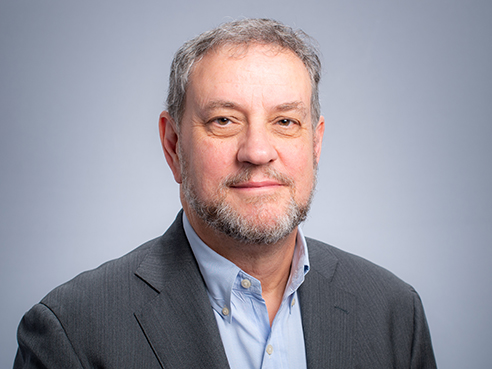 Jeff Walker, Ph.D., professor and chair for the Department of Criminal JusticeJeff Walker, Ph.D., traces his interest in interdisciplinary work to his days as a graduate student at Sam Houston State University earning a doctorate in criminal justice. Only one professor in his program had a doctoral degree in the field, and the others worked in education, law, social work, psychology and sociology. Consequently, the tenets of interdisciplinary work were imbued early in his academic career.
Jeff Walker, Ph.D., professor and chair for the Department of Criminal JusticeJeff Walker, Ph.D., traces his interest in interdisciplinary work to his days as a graduate student at Sam Houston State University earning a doctorate in criminal justice. Only one professor in his program had a doctoral degree in the field, and the others worked in education, law, social work, psychology and sociology. Consequently, the tenets of interdisciplinary work were imbued early in his academic career.
Now professor and chair for the Department of Criminal Justice in the College of Arts and Sciences, Walker channels those early lessons into his work at UAB. He researches neighborhoods — work that he says necessarily involves studying poverty, violence, crime and revitalization and require cross-community partnerships with nonprofit organizations and governments and interdisciplinary collaborations with researchers studying economics, public policy and government, public health, real estate and more. A nominator writes that Walker’s expertise in geographic information systems is sought after by colleagues who work in the Lister Hill Center for Health Policy, the School of Engineering and the departments of Political Science and Public Administration and Health Care Organization and Policy, among others.
|
“If you’re trying to stop hackers and fraud, you have to understand people, too. You can’t just understand programming, but also [must understand] psychology and sociology.” |
“All those kinds of things are important for neighborhoods, so you have to be collaborative and broad-based,” Walker explained.
In recognition of his collaborative work across campus, Walker has earned the 2020 Sam Brown Bridge Builder Award, which recognizes a faculty member who engages in interdisciplinary, collaborative efforts across campus in ways that embody the vision, character and bridge-building talents vital to the future of UAB; he will be recognized during the annual Faculty Convocation, to be held later this fall.
Creating partnerships
UAB’s Department of Criminal Justice is incredibly interdisciplinary, Walker says. With criminal justice, forensic science and computer forensics programs and programming that pairs computer forensics and criminal justice and pre-law with political science, the department has the same interdisciplinary feel that Walker experienced as a student.
“One of the things we discuss in our digital forensics undergraduate program is that you can learn a lot about computers and focus on that, but there’s someone on the other end of that computer — so if you’re trying to stop hackers and fraud, you have to understand people, too. You can’t just understand programming, but also [must understand] psychology and sociology.”
|
“It is his excellent leadership, communication and relationship skills that keep everyone on board and committed.” |
As our world becomes more complex, Walker says fewer educational paths are isolated within a single discipline, so it’s important to connect with colleagues in other fields.
“When I’m working together with people, I get exposed to ideas and information that I didn’t know and hadn’t thought about,” he explained. “It helps me in my thinking: it broadens it and helps me understand things from other people’s viewpoints.”
Walker’s reputation for collaboration precedes him on campus, a nominator writes. In the UAB Center for the Study of Community Health, Walker works with the center’s core research project, Community Health through Engagement and Environmental Renewal (CHEER), which requires cross-campus collaboration among everyone from part-time data entry staff to department chairs and deans.
“It is his excellent leadership, communication and relationship skills that keep everyone on board and committed to the project,” the nominator wrote.
Understanding COVID-19 and disparities
Most recently, Walker’s collaborative spirit is highlighted in his work with the UAB Center for AIDS Research, which just received a two-year, $5 million award from the National Institutes of Health for the NIH Rapid Acceleration of Diagnostic Initiative implementing the RADx Underserved Populations (RADx-UP) program in local communities.
RADx-UP will support research to better understand COVID-19 testing patterns among under-served and vulnerable populations, strengthen the data on disparities in infection rates, disease progression and outcomes and develop strategies to reduce the disparities in COVID-19 testing. Walker is one of several study collaborators from the College of Arts and Sciences and others include faculty from the schools of Medicine, Public Health and Health Professions. The team of researchers will work with clinical and community partners statewide to understand the social and structural factors driving disparities in COVID-19 outcomes.
|
“He has a friendly, easygoing temperament that, combined with his wicked smarts, makes him a natural addition to any team. He’s someone you just want to work with.” |
It takes many viewpoints to understand how to work with different people and learn what they need — and avoid mistakes that would make them not want to work with you, Walker explained.
A nominator writes that Walker’s partnership with CFAR on the COVID-19 NIH grant is perhaps his “most impressive” work.
“He has a friendly, easygoing temperament that, combined with his wicked smarts, makes him a natural addition to any team,” a nominator wrote. “He’s someone you just want to work with.”
Changing the world
In a recent conversation with Sam Brown, a retired UAB faculty member for whom the award was named, Walker discussed the importance of coming together as a university.
“We have to do that so we can go into communities and collaborate with those communities in order to improve our world,” Walker said. “That’s really what this is all about — building bridges within the university and the community.”
